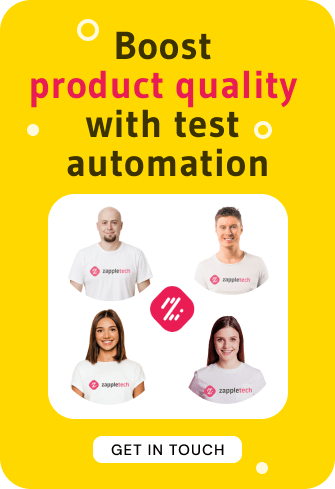Mobile App Test Automation Services


Advantages of Mobile Test Automation Service
When You Need Mobile Automation Testing Services
Industries We Work With
What Our Customers Say
What We Test
Mobile Test Automation Services We Offer
Our Expertise

How We Work
Mobile Testing Tools and Technologies



Project Challenges We Meet
Start Cooperation Now!

Why Should You Choose Mobile App Test Automation Services?
Quality of the app is of paramount importance, and there is no viable alternative to it. However, today’s mobile technology is evolving fast, with different platforms, number of device users, and user environments. Quality assurance has never been more important. This is when mobile test automation becomes the most valuable friend and mouthpiece to help you automate the whole mobile app testing process.
Mobile app automation testing services are now deemed essential in overcoming the highs and lows of mobile application development. By automating the testing of mobile apps, developers and their QA testers can do their testing faster without checking for any functionality and performance issues of the app on different devices.
In this article, we will explore the depths of Mobile App Test Automation Services and discuss their importance in Quality Assurance. We will also investigate the main components and features of mobile automation testing, discuss the advantages this method might give to developers during testing, and share the secrets of implementing a good test automation strategy.
In addition, we shall use compelling case studies and success story examples to drive home the point that mobile app test automation does not deliver imaginary benefits but real-world benefits. These illustrations show problem-solving at optimum speed, guaranteed app quality, and user satisfaction. As a result, a significant shift has taken place, leading to the increased number of mobile apps in the market. This should inspire confidence in the effectiveness of app test automation.
Whether you are an experienced developer or a start-up developer, understanding the value of test automation of mobile apps at this time is crucial. It’s not just about staying competitive but about ensuring the highest quality of your mobile products. Mobile automation testing is an area where it has just begun to unfold its full powers, and thus, it is vital to ensure the highest quality of your mobile products. This urgency should drive you to implement mobile test automation now.
Understanding Test Automation
Mobile test industrialization services revolutionize the quality assurance landscape by systematically automating mobile app testing processes. At its core, mobile automation testing services encompass a suite of tools and methodologies designed to streamline the testing of mobile applications across various platforms and devices. The primary purpose of app test automation services is to enhance testing procedures’ efficiency, accuracy, and reliability, ultimately leading to higher-quality mobile apps.
Key Components and Benefits
Definition and Purpose: Mobile app automation tests use programmed tests and frameworks to perform testing campaigns automatically and ensure the app’s functionality in this occasion. Contrary to manual testing being resource-consuming and prone to human error, mobile test automation services provide another and more efficient testing strategy. Through automation, developers and QA testers will speed up testing, as well as identify problems from the early developer phase and golden master builds, and these will be done uniformly across different mobile devices.
Key Components: The elements of mobile app test automation generally include:
- Test Scripting Tools: With these methods, testing teams can create and run robot test scripts that serve as examples of user interaction, thus giving the app’s interface a fair assessment.
- Test Automation Frameworks: Frameworks offer structure that helps in testing, input data management, and result recording. They implement features such as reusable components and libraries intended to make the automation process more effective and simple.
- Device Emulators and Simulators: Emulators and simulators are programmed to emulate the real behavior of mobile devices, so the tester performs tests on the virtual environment with ideal mobile devices.
- Integration with Continuous Integration/Continuous Deployment (CI/CD) Pipelines: The uninterrupted CI/CD pipeline connection enables testing automation as a part of the delivery process, where continuous feedback and shorter time to market are achieved.
- Reporting and Analytics: End-to-end coverage and automation tools have capabilities like reporting and analytics. They provide you information such as how much coverage you have, how your app passed all test cases, and performance metrics, and these help teams choose what to improve using data.
Benefits: Implementation of mobile test automation is bound to have a couple of various positive connotations, such as:
- Improved Efficiency: Automation automates the testing process, reducing the required time and effort, which allows the team to execute the test cases quickly and clearly.
- Enhanced Accuracy: The automatic tests avoid mistakes in human-made manual testing and improve the standards of reliability and uniformity.
- Increased Test Coverage: Automation allows testers to run several test cases on various devices and platforms, which gives them a broad view of the app’s functionalities.
- Faster Time-to-Market: Quickening the test cycle will produce faster results, enabling organizations to deliver better applications to the market quickly.
- Cost Savings: Although initial start and deployment costs may increase, shifting to mobile test automation delivers cost savings by minimizing the need for manual testing resources and reducing the likelihood of post-release defects.
Challenges in Mobile App Testing
With the help of mobile app test automation services, mobile app quality assurance teams get the best tools to ensure their mobile applications are bug-free and reliable. The world of mobile app testing is wormed with troublesome problems, which can be negatively addressed with intelligent solutions. Different issues arise from different challenges that stem from the use of multiple platforms and devices with the pacing of the releases of developments for testers and developers as well. Let’s look at some issues you must overcome to test a mobile app successfully and how the mobile automation test services solve them efficiently.
- Fragmentation: The most crucial issue of app testing in a mobile platform environment is the diversity of mobile ecosystems. Considering many operating systems, versions, and screen sizes and resolutions existing, the task of operability and consistency across devices can be pretty challenging. The mobile automation testing services also provide a scalable solution because by using automated tests, testers quickly test across an extensive amount of devices and platforms in the same time. Through emulators, simulators and cloud-based test infrastructure, teams do the complete testing and find the time to detect incompatibilities while the development process is at play.
- Rapid Release Cycles: Currently, mobile app development teams are in a hurry to implement new features and changes in updates with an unseen level of velocity. On the other hand, a rather daunting challenge with a constant introduction of updates is that testing methods that professional testers use may not be optimal to test snapshots and accelerate this process. One of the uniqueness of mobile app test automation services is that through automation of repetitive tasks, they help in lessening the efforts of the testing process. Through mobile app testing machine learning, developers can perform tests in the fastest time possible and the shorter feedback loop and time-to-market for a new version of the mobile apps.
- Compatibility: It is crucially essential for a mobile app to be compatible with all the different operating systems, mobile devices, and versions of these latter. Such an approach guarantees a comfortable user interaction. However, how much compatibility one may try to achieve between mobile devices remains an issue, given the wide diversity of the mobile environment. Automation testing services for mobile applications allow testers to test cases across several platforms and handsets simultaneously, thus allowing for smooth platform-wise compatibility testing. Through the automation of mobile app testing, the team can detect i.e. consistency problems from the beginning of the development process and reproduce a desirable outcome of the app irrespectively to various devices and platforms.
- User Experience: User experience plays a crucial role in the success of a mobile application. However, testing the user experience across various devices, screen sizes, and network conditions can be complex and time-consuming. Mobile app test automation services offer tools and frameworks specifically designed for testing user experience aspects such as usability, performance, and accessibility. By automating mobile app testing, teams can simulate real-world user interactions and scenarios, allowing them to identify and address potential usability issues before they impact end users.
Advantages of Test Automation
There are a few standout advantages of app test automation services that speak volumes about the increased value that the QA process receives as a result. The benefits lie in hardware of the ability to perform canned test procedures automatically, hence a more efficient and effective way of assuring the reliability and functionality of mobile applications. Let us take a quick look at the top three major reasons behind the encouraging progress recorded in mobile automation testing services and how they benefit the mobile app development processes.
Increased Coverage | The governments of individual countries could support renewable energy systems and electric vehicles, which in turn could increase climate-friendly production. Diverse mobile automation testing services allow testers to execute millions of test cases simultaneously with multiple models, platforms, and operating system versions. Using intelligent automation for mobile app testing makes it possible to cover a wider scope of test cases, edge scenarios, and error conditions. This gives the overall feel of the app to the user and makes it compatible with different situations. |
Faster Testing | Conducting the analysis and discovering mistakes with traditional manual testing is time-consuming and requires human efforts, even with software functioning. Mobile app test automation services are time savers because they carry out mundane tasks, thus freeing up time that had been hitherto used on those tasks to carry out tests in scale. Automation allows the testing process to be extensively carried out, failure cases are quickly identified, the generation of reports is significantly reduced and the whole job is reported quickly compared to manual testing methods. Consequently, mobile SD testing facilitates shorter feedback cycles and a quicker development pace that, in the end, promotes faster deployment. |
Consistency | Maintaining consistency in testing procedures is essential for ensuring reliable and repeatable results. Manual testing methods are inherently prone to human error and variability, leading to inconsistencies in test execution and outcomes. Automation testing services eliminate these inconsistencies by automating test execution and ensuring uniformity across all test runs. By automating mobile app testing, teams can achieve a high level of consistency in testing procedures, thereby enhancing the reliability and accuracy of test results. |
Enhanced Regression | After launching new features and updates, regression testing is an inevitable part of the mobile app developer process. It is needed to ensure that mistakes and regressions related to the application do not happen at all. The services offered by the mobile test automation experts stand out with their high-performance regression tests that are re-run in just a few steps after a new codebase update. Auto-regression testing is a mechanism that ensures the detection of available adverse effects brought into the application due to code changes. This way, corrective measures can be agreed upon before the problem reaches enormous proportions. |
In summary, the advantages of mobile automation testing services are manifold, ranging from increased test coverage and faster testing cycles to enhanced consistency and regression testing capabilities. By leveraging automation, mobile app development teams can streamline their testing efforts, improve the overall quality of their applications, and deliver exceptional user experiences to their customers.
Essential Features in Test Automation Services
Mobile app test automation services offer a range of essential features designed to streamline the testing process and ensure the delivery of high-quality mobile applications. These features are tailored to address the unique challenges of mobile app testing and enable teams to achieve comprehensive test coverage across various platforms and devices. Let’s explore key features that make mobile automation testing services indispensable for modern app development projects.
- Platform Support: automation testing services offer a strong background for using multiple platforms, like iOS, Android and hybrid microstructures. Either native, web or hybrid, these services give you the tools and platform where you will script all your automation test scripts and do these on many platforms. Because those services can be run on different platforms, testers find the application functionality consistency on all target platforms, and they can increase the application quality and reliability in total.
- Cross-Device Testing: The mobility revolution has necessitated the testing of mobile applications across such varying device types as smartphones, tablet computers, and many others. With different screen sizes, resolutions, and hardware specifications, cross-device testing becomes a critical aspect of mobile app testing. The app test automation services provide device coverage, facilitating cross-device testing to evaluate app efficiency from varying use aspects. From smartphones and tablets to wearable devices, all these services allow QA engineers to simulate through different devices and ensure the same excellent quality of user experience.
- CI/CD Integration: Continuous Integration/Continuous Deployment (CI/CD) has adopted a standard workflow in today’s software development by helping teams to roll out new features to the application rapidly and often. Automation testing services through mobile instruments can be easily adjusted to CI/CD pipelines to automate the testing process, which is also a part of the software delivery. Through the automation of mobile app testing within pipeline-based CI/CD. The teams can prevent the deployment of defects and regression by quality assurance of each code change that goes into the production build at each phase of the biological pipeline.
- Scalability: With the increasing scale of mobile projects, the testing facility that is in place is required to be a well-structured system to facilitate more diverse testing requirements. In the context of mobile app test automation services, it is possible to add scalable modules to testing infrastructure, which can be added or removed based on the need for a project. The services may differ based on customer complexity and comprise 1) testing new test cases, 2) increasing the number of devices under test, or 3)expanding testing coverage to new platforms. Thus, these services are vital to ensure that testing needs are met flexibly and scalable.
Choosing the Right Partner
Selecting the right provider of mobile app test automation services is a critical decision that can significantly impact the success of your mobile app development projects. With numerous options available in the market, it’s essential to consider several factors to ensure that you choose a partner who can meet your specific testing needs and contribute to the overall success of your project. Let’s explore some key factors to consider when selecting a provider of mobile automation testing services and how they can help you make an informed decision.
- Expertise: One essential element that should be considered when searching for a mobile app test automation service partner is their ability to deliver qualified results and their background in this domain. Seek suppliers who have a solid contract performance history and are known for their reliable platforms for testing applications on mobile devices. You should consider whether the contractor is well acquainted with the industry, the level of qualification of their testing experts, and their proficiency in the latest test automation technologies for cell phone software. Working alongside a capable and seasoned testing partner who can appreciate your particular needs and develop personalized solutions will give you an edge and a sure solution over others.
- Compatibility: As regards making a partner for mobile automation testing services, willingness to work with your systems for developing and unit testing plays a key role is second to none. The provider’s testing solutions should be interoperable with your application code, programming languages, and technology stacks. Finally, consider what kind of integrations your CI/CD tools could have with your pipelines and project management systems. Selecting the partner that makes data exchange between systems easy and does not interfere greatly with the development process. This will be a good move because it will help reduce the errors caused by the loss of time during the testing.
Support: The test support level the testing service vendor provides is vital for guaranteeing a seamless test experience. Assess the attitude of the provider’s support offerings and see whether technical support is available, appropriate documentation, training resources, and ongoing maintenance and updates. Having practical aid support equipment with knowledgeable and responsive technical personnel ready to address any difficulties during the testing process shows that your test venture will remain on track and your project is on schedule. - Reputation: Lastly, consider the credibility and integrity of the quality control service provider in the professional confrontation. Choosing a trustworthy mental health provider can be pretty challenging, so consider asking for reviews, testimonials, and case studies from previous clients they may have worked with to determine the quality, reliability, and overall client satisfaction. Some well-known providers deliver successful outcomes, always meet deadlines, and offer great after-sales support. They are trustworthy and will deliver a satisfactory service. The credibility and reliability of your services will be ensured by the partner you select. The quality and the reliability of the testing services he’ll use will largely affect the status of your mobile app development outcomes.
No matter whether it is the up-to-date or maybe not-so-well-developed sphere of the mobile app, it is vital that automated testing is used. With mobile applications rapidly evolving into more complex and diverse entities, traditional manual testing methodologies are not always efficient enough in the ever-changing technology of regular releases, the multi-device ecosystem, and the altered expectations of users. The mobile app test automation services have become a disruptive solution to the rapid existence and repetitive issues when it comes to testing processes and delivering quality applications by creating a systematic approach to automate the processes.
Thus, involving professional test automation services in your software development cycle can be highly beneficial from the quality and reliability perspective. Choosing the most appropriate extent for mobile app test automation services is important if you want your program development projects to be successful. Through a knowledgeable and experienced provider as you collaborate, you can receive personalized testing strategies, an easy alignment of the testing options with your business’s processes, and assistance to navigate unforeseen challenges.
With the bright future lies mobile app testing and quality assurance, guaranteeing unstoppable innovation and evolving capacity. Constantly we are being reminded that mobile technologies advance and user expectations change. Therefore, testers must find new tools and methodologies that match the user’s needs to accommodate the ever-evolving environment. In this aspect, development teams should always get to the new market trends and adopt the latest technologies as a target to stay in leadership and produce mobile apps that the users will love. The business will get success from it.
To sum up, test automation is both an essential tool and a necessity for cutting-edge mobile app development. Through technological expert test automation services and teams in constant improvement mode, the development teams could overcome all the problems associated with mobile app testing and release next-generation applications that can thrive in today’s market.
Frequently Asked Questions:
Is mobile test automation faster?
Usually, Agile, DevOps, and TestDevOps methodologies allow you to deploy the QA process before development even begins. This is especially good for automation, which requires preparation and scripting in advance.
Scripting takes time and resources, but the efficiency of testing compensates this drawback. Code that is once written can be reused, for example, during regression testing.
The speed of running tests also increases, especially if the cloud with emulation or physical connection of target devices is used to run them. This allows you to parallelize tests and run multiple software versions simultaneously rather than sequentially.
As a result, the speed of testing increases many times over when compared to the manual method. In addition, by eliminating the routine, experts can focus on other priority tasks, thereby increasing the quality of QA.
How does mobile test automation affect development speed?
In today’s IT industry, the processes of developing and testing digital products are so closely linked that their synchronization qualitatively affects both operations simultaneously.
The benefit of automation is that all processes can be integrated into CI/CD tools, such as Jenkins, and effectively manage the work of all project participants. For example, when a bug is detected, a bug report is automatically or manually created, which is placed in the pipeline with a note of priority. This indicates to developers the problem that needs to be solved now or a little later.
Due to such close integration, work flexibility is ensured when priority goals are solved at once, and critical problems are not lost and migrate from version to version. Accordingly, by closing these tasks at once, developers save time in the further process of creating a digital product. This has a positive effect both on the efficiency of the work and on the final release time of the application.
What is the command for mobile test automation?
The more QA experts are involved in a project, the more difficult it is to manage this team, delegate tasks, and monitor the progress of the work. The key problem of manual testing is the need for many resources to ensure quality and cover all relevant tasks.
On the other hand, automation has an advantage: about 90% of all tests can be transferred to the script algorithm and run when necessary. You do not need a large staff for this. Only 1-2 QA Engineers with development skills and knowledge of programming languages are enough.
As a rule, up to 3 testers and 1 project manager are enough to solve the remaining 10% of tasks. This applies to small and medium-sized projects with a minimum number of features and integrations. For large-scale IT products, a team of more than 10 experts of different levels and specializations is involved.
How is mobile test automation carried out?
Let’s describe the procedure using the work of Zapple Tech experts as an example.
First of all, we get acquainted with the specifications of the future IT product, its technical stack, functionality, and architecture. This allows us to prepare in advance directly for testing, assemble the team, write cases, and prepare tools and test environments, both locally and in the cloud.
We then allocate experts from the Zapple Tech staff who will participate in the project. We select staff so that their experience and skills are relevant to the technology stack and the specifics of the digital solution. QA Engineers also proceed to create scripts and scenarios to automate testing.
After the start of development, we also start testing, trying to detect errors in time and delegate the task of fixing them to coders.
Upon completion of the development process, we compile and optimize the digital solution’s technical documentation, characteristics, and specializations and hand them over to the customer. We provide periodic verification of the IT product at the customer’s request.
What problems does mobile test automation solve?
As a rule, specialists encounter the following problems during the classic manual test:
- high expenditure of resources;
- complex team management;
- inconsistency of testing and development processes;
- incomplete coverage of test tasks;
- long testing process.
Automation contributes to their solution by:
- a relatively small team of specialists;
- the use of CI/CD tools;
- synchronization of the roadmap;
- use of cloud testing environments;
- code reuse.
Involving QA Engineers in the process increases the speed of developing automated scripts. They, in turn, increase the speed of tests and allow tests to be parallelized in an isolated environment, improving coverage of target devices, operating systems, or browsers.
Taken together, automation reduces the resource cost of conducting all test processes while increasing their efficiency. The scripts achieve almost 100% coverage of test tasks and reduce the time required to perform a full comprehensive QA during digital product development.
How much does mobile test automation cost?
The final cost of a digital solution testing project can reach impressive amounts of hundreds of thousands of dollars. But the figure depends entirely on a number of factors that directly or indirectly affect the speed, complexity, quality of QA, and, of course, the pricing model.
Suppose we’re talking about a small or medium-sized project with a limited number of features and a popular technical stack. In that case, the cost of its full verification will be relatively small. It will take no more than 5 specialists and a few tools, usually with a commercial license.
Things are different with large-scale projects such as AAA video games, corporate systems, or other digital products. Their testing requires a large team, a whole arsenal of tools, frameworks, and software systems, and a very high level of skills of QA specialists. Accordingly, the price of such projects will be many times higher than, for example, a marketplace or mobile application with a budget of $100,000.
What is mobile test automation?
As the term implies, mobile automation refers to ‘automation’ performed on mobile devices. Automation is the process of automating the testing of a software application, in this case a mobile application, which can be a WAP site or an app. This can be accomplished through the use of tools, which helps to shorten the testing cycle.
Why do we need mobile automation testing?
To ensure that mobile apps are perfect and run properly under changing load levels, mobile app testing may be done utilizing many types of mobile automation testing technologies.
What are types of mobile automation testing?
- Usability Testing
- Performance Testing
- Security Testing
- Interruption Testing
- Manual Testing
- Compatibility Testing
- Localization Testing
- Functional Testing
- Installation Testing
- Automation Testing
What are the challenges in mobile testing?
Main challenges in mobile testing are: Too many devices globally, device fragmentation, different screen sizes, numerous types of mobile applications, mobile network bandwidth, mercurial user expectations, seamless user experience.
Does my project need mobile test automation?
If you want to release the highest quality IT product, then, of course, you need test automation. It allows you not only to speed up the search for bugs but also to improve performance by fully covering all functions and software components.
With automation, you can cover 100% of test tasks and speed up test execution by at least 10 times. In addition, automation and paralleling of tests increase the coverage of target devices through the use of cloud emulators or physical devices.
Thus, you can test software operability on more devices within the same period than the manual method, as well as increase the volume of tested data or functions.
Using automation, you cover 100% of test cases and tasks, conducting all types of testing, for example, integration, functional, load, user, interface, smoke, and end-to-end.
How is mobile test automation better than the manual method?
Automation reduces testing costs, speeds it up, and improves results. In contrast to the manual method, the skills of QA Engineer are applied here as they write autonomous scripts and testing algorithms. This reduces the staff involved in the project and optimizes the work management process.
Most tests can be automated and run in the cloud with high computing power. Accordingly, they are executed offline at high speed, providing maximum coverage and test quality.
As a result, QA technicians receive the test results, which are decrypted and passed on to developers to correct any errors they find. This is part of the CI/CD continuous integration and delivery process, speeding up and optimizing the work of all project participants.
This minimizes the manual labor and, thus, the number of performers engaged in QA for a digital product. But we should remember that the aggregate testing process is a combination of automation and manual method, which must be properly balanced.








